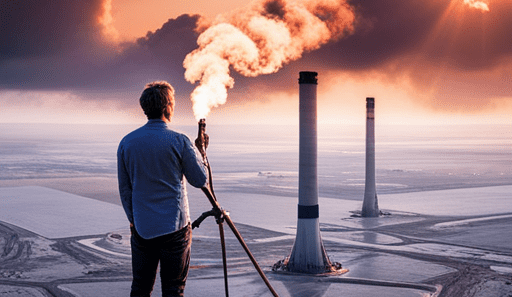Global warming has become one of the most pressing issues of our time, invoking passionate debate over its causes and implications. The discussion surrounding human culpability in the climate crisis spans a spectrum of viewpoints, each imbued with scientific rigor and emotional fervor. This article seeks to explore the dichotomy of opinion regarding human-induced global warming, presenting arguments both for and against the notion that humanity is primarily responsible for the planet’s rising temperatures.
The phenomenon of global warming is not merely an abstract scientific concept; it has tangible effects on the environment. Glacial melts, rising sea levels, and increasingly erratic weather patterns serve as stark reminders of the changes our planet is undergoing. One compelling observation is that many species, such as certain sea turtles, are experiencing gender imbalances due to altered nesting temperatures. A crucial point of concern arises here: how much of this change can be attributed to anthropogenic factors? Advocates for the view that humans are chiefly responsible cite extensive data correlating industrial activities with atmospheric changes.
Proponents of human blame in the climate debate underline a plethora of evidence linking fossil fuel consumption, deforestation, and agricultural practices to increased carbon emissions. The Intergovernmental Panel on Climate Change (IPCC) has repeatedly concluded that there is a statistically significant relationship between elevated greenhouse gas concentrations and rising global temperatures. With carbon dioxide levels higher than they have been for millions of years, the question emerges as to who or what is managing this unprecedented acceleration. The industrial revolution, marked by a surge in the burning of coal, oil, and gas, initiated an era of substantial ecological disruption.
Moreover, scientific consensus reinforces the argument that human activities are the predominant drivers of climate change. This is further substantiated by climate models projecting future trajectories under varying scenarios of human intervention. These models reveal that even modest reductions in greenhouse gas emissions could significantly temper projected warming trends, effectively arguing for a direct line of accountability. Activists often highlight these facts in awareness campaigns, advocating for policy changes aimed at carbon reduction and renewable energy implementation.
Conversely, some skeptics challenge the prevailing narrative, arguing that climate change is a natural phenomenon, citing historical fluctuations in the Earth’s climate. The Earth has undergone cycles of warming and cooling over millennia, some positing that the current warm spell merely reflects another natural sequence rather than an anomalous occurrence precipitated by human behavior. They argue this perspective encourages a broader examination of long-term climatic patterns, which should not solely attribute blame to contemporary industrial practices.
Furthermore, the complexity of climate systems features prominently in dissenting viewpoints. Critics point to variables such as solar radiation, ocean currents, and volcanic eruptions as natural contributors to rising temperatures. This multifactorial approach raises essential questions about the extent of human influence amid a spectrum of natural phenomena. Some argue that concentrating solely on human activities detracts from understanding the extensive, interconnected processes that govern climate dynamics.
In addition, the economic ramifications of a human-blame perspective cannot be overlooked. Opponents of stringent climate policy warn of potential job losses, particularly in traditional energy sectors reliant on fossil fuels. They advocate for a gradual transition towards a sustainable energy economy rather than abrupt changes that could destabilize communities and economies. This economic discourse often complicates the morality of human blame; the urgency to act against climate change must be weighed against the immediate socio-economic consequences of such actions.
Moreover, a significant aspect often overlooked in the debate is the role of misinformation and media representation in shaping public perception of human impact on climate change. Reports of extreme weather events and climate-related disasters are frequently sensationalized, fostering an emotional response that can skew rational discourse. The public may not always differentiate between scientifically vetted information and alarmist narratives. This dynamic raises concerns about how data is presented and its subsequent interpretation in the arena of public policy.
Despite the contention, the potential interplay between humanity and natural factors presents an opportunity for collective inquiry. Advocating for sustainability does not require fully dismissing the concerns of those who attribute more weight to natural phenomena; rather, it invites dialogue aimed at holistic understanding. A truly interdisciplinary approach that integrates economic, environmental, and scientific perspectives may yield more effective solutions to climate issues.
As we traverse this complex landscape, it becomes apparent that the trajectory of humanity’s relationship with the environment is fraught with challenge and responsibility. One may argue that whether or not global warming stems from human activity, the stewardship of Earth is a moral imperative. With rising sea levels threatening coastal communities, and ecosystems under duress, a unified response is crucial to mitigate inevitable consequences.
In conclusion, while the debate on human culpability in global warming is polarized, it serves as a profound reflection of deeper societal values regarding environmental responsibility. Regardless of individual stances, the overarching goal remains to foster a sustainable future in which both humanity and nature can thrive. Whether through acknowledging our part in the current climate crisis or understanding the wider natural interactions at play, the urgency of the climate issue demands thoughtful exploration and proactive engagement. The road forward will require integrating insights from various domains, fostering a comprehensive response to one of the most critical challenges of our era.







